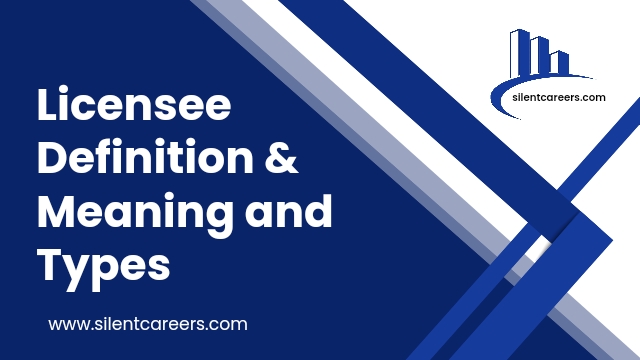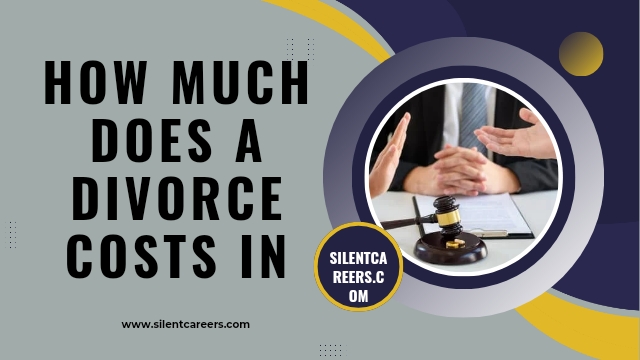
Licensees definition: A licensee is an individual or entity granted legal permission to perform specific activities, such as practicing a profession or conducting business, under a regulatory framework. In real estate, licensees include brokers, agents, and salespersons, each with distinct roles and responsibilities, regulated by state laws and licensing authorities.

What is a Licensee?
A licensee is an individual or entity that has been granted permission by a governing authority to engage in a particular activity or profession. This permission is typically formalized through the issuance of a license, which sets out the rights, responsibilities, and regulations the licensee must adhere to. In various fields, licensees must meet specific qualifications, maintain certain standards, and often undergo periodic renewals to ensure compliance with regulatory requirements.
Licensee definition in the Cambridge English Dictionary
The definition of “licensee” in the Cambridge English Dictionary is:
licensee (noun) [countable] UK /ˌlaɪ.sənstˈsiː/ US /ˌlaɪ.sənstˈsiː/
- a person or organization that has official permission to do something, especially to sell alcoholic drinks
Here are some additional notes:
- The Cambridge English Dictionary focuses on definitions used in British English. The provided definition highlights the concept of an official permission, often associated with selling alcohol.
- This definition aligns with the broader concept of a licensee having limited rights granted by a licensor. In this case, the “official permission” is the license, and the “something” could be various activities beyond just selling alcohol (e.g., using software, practicing a profession).
For a more comprehensive understanding, you can also refer to the general definition of “licensee” that I provided earlier. It explains the concept in more detail and offers a wider range of examples.
How does a licensee work?
A licensee operates under a legal framework where they are granted permission to perform specific activities or use certain properties, usually governed by a licensing agreement. Here’s a breakdown of how a licensee works:
Steps and Functioning:
- Obtaining the License:
- Application: The individual or entity applies for a license from the relevant regulatory authority.
- Qualifications: The applicant must meet certain qualifications, which may include education, training, experience, and passing exams.
- Fees: Payment of any required fees for processing the application and issuing the license.
- Licensing Agreement:
- Terms and Conditions: The licensing agreement outlines the terms under which the licensee can operate, including the scope of activities allowed, duration of the license, and any limitations.
- Rights and Responsibilities: The agreement specifies the rights granted to the licensee and their responsibilities to maintain the license.
- Compliance and Regulation:
- Adherence to Regulations: The licensee must comply with all regulations and standards set by the licensing authority. This includes ethical practices, safety standards, and other relevant laws.
- Periodic Renewal: Licenses often require periodic renewal, involving continued compliance with regulatory requirements and sometimes additional training or education.
- Operational Activities:
- Service Provision: The licensee provides services or conducts activities within the scope defined by the license. For example, a real estate licensee can buy, sell, or manage properties.
- Monitoring and Reporting: The licensee may need to maintain records and report activities to the licensing authority to ensure ongoing compliance.
- Renewal and Continuing Education:
- Renewal Process: Licenses must be renewed periodically, which may involve demonstrating continued competence, paying renewal fees, and completing any required continuing education.
- Continuing Education: Many professions require licensees to complete ongoing education to stay updated on industry standards, regulations, and best practices.
Example in Real Estate:
- Real Estate Agent: A real estate agent obtains a license by meeting state educational requirements, passing a licensing exam, and applying to the state’s real estate regulatory body.
- Broker: After obtaining additional experience and education, a real estate agent may become a licensed broker, which allows them to own a real estate firm and supervise agents.
- Operational Role: The agent can list properties, negotiate sales, and assist clients in buying or selling real estate, all while adhering to state laws and ethical guidelines.
Advantages of a licensee
Being a licensee offers several advantages:
- Legitimacy: Holding a license provides legal authority to perform specific activities, enhancing professional credibility and trust with clients.
- Market Access: Licenses grant access to regulated markets, enabling the licensee to offer specialized services or products.
- Competitive Edge: Licensed professionals often have a competitive advantage, as clients and customers prefer dealing with authorized and regulated individuals or businesses.
- Liability Protection: Licensing may include certain legal protections, reducing personal liability for business activities.
- Compliance: Ensures adherence to industry standards and regulations, fostering ethical practices and enhancing reputation.
These benefits help licensees establish a solid foundation for successful and compliant operations in their respective fields.
Types of Licensees
Licenses can cover a wide range of activities. Some common examples include:
Understanding Licensees
A licensee is an individual or entity granted legal permission to perform specific activities, typically under a licensing agreement. This arrangement is common in various professions, including real estate, healthcare, and law, where regulatory bodies oversee licensing to ensure standards and protect public interests.
Key Aspects of Licensees:
- Legal Authority:
- Licensees operate with the legal authority to provide specific services or use particular assets, granted by a regulatory body or property owner.
- Regulatory Compliance:
- To obtain and maintain a license, licensees must comply with industry-specific regulations, standards, and continuing education requirements.
- Types of Licensees:
- Professional Licensee: Professionals such as doctors, lawyers, and real estate agents.
- Business Licensee: Entities that hold licenses to operate certain types of businesses, like restaurants or retail stores.
- Benefits:
- Provides legitimacy and credibility.
- Ensures access to regulated markets.
- Offers legal protections and reduces personal liability.
- Responsibilities:
- Adhere to ethical and professional standards.
- Maintain compliance with regulatory requirements.
- Renew licenses periodically and fulfill continuing education obligations.
Example in Real Estate:
- A real estate agent must obtain a license by completing required education, passing an exam, and applying to the state’s real estate board. This license allows them to legally assist clients in buying, selling, or renting properties while adhering to state laws and industry standards.
Understanding the role and responsibilities of a licensee is crucial for ensuring compliance, maintaining professional standards, and effectively utilizing the rights granted by the license.
Franchisees
Franchisees are individuals or entities that purchase the rights to operate a business under the established brand and business model of a franchisor. By doing so, they benefit from the franchisor’s proven system, brand recognition, training, and ongoing support. In return, franchisees typically pay an initial franchise fee and ongoing royalties based on revenue. Franchisees must adhere to the franchisor’s operational guidelines to maintain brand consistency and quality. This arrangement allows franchisees to leverage an existing brand’s success while the franchisor expands its market presence through a network of independently owned and operated locations.
Brand Licensing
Brand licensing is a strategic business arrangement where a brand owner (licensor) grants permission to another party (licensee) to use its brand, trademark, or intellectual property for specific purposes and within defined parameters. This allows the licensee to leverage the brand’s reputation and recognition to market and sell products or services, while the licensor earns royalties or fees.
Key Aspects of Brand Licensing:
- Licensing Agreement:
- Terms and Conditions: Outlines the scope of use, duration, territory, and financial arrangements.
- Rights Granted: Specifies what aspects of the brand can be used, such as logos, trademarks, or product lines.
- Financial Arrangements:
- Royalties: The licensee pays the licensor a percentage of sales revenue.
- Upfront Fees: Initial payment for the rights to use the brand.
- Benefits for Licensors:
- Revenue Stream: Generates additional income without direct investment in new markets.
- Brand Expansion: Increases brand presence and market penetration.
- Benefits for Licensees:
- Brand Recognition: Leverages established brand equity to attract customers.
- Reduced Risk: Lowers marketing and development costs by using a proven brand.
- Responsibilities:
- Quality Control: Both parties must ensure that products or services meet the brand’s standards.
- Compliance: Licensees must adhere to the licensor’s guidelines to maintain brand integrity.
Operating License
An operating license is a formal authorization granted by a governing body that allows a business or individual to conduct specific activities legally. These licenses ensure that the business meets regulatory standards and operates within legal guidelines, promoting safety, compliance, and quality assurance in various industries.
Key Aspects of an Operating License:
- Purpose:
- Authorizes legal operation in a specific industry or profession.
- Ensures compliance with local, state, or federal regulations.
- Application Process:
- Submission: Complete and submit an application to the relevant authority.
- Requirements: Provide necessary documentation, such as proof of qualifications, business plans, and safety measures.
- Fees: Pay applicable application and licensing fees.
- Regulatory Compliance:
- Adhere to industry-specific regulations, standards, and codes.
- Undergo inspections or audits as required by the licensing authority.
- Types of Operating Licenses:
- Business License: General license required to operate a business.
- Professional License: Required for professions such as healthcare, law, real estate, and accounting.
- Industry-Specific License: For businesses in regulated industries like food service, construction, and transportation.
- Renewal and Maintenance:
- Periodic Renewal: Licenses often need to be renewed periodically, involving a renewal application and fees.
- Continuing Compliance: Maintain ongoing compliance with regulatory requirements and any updates to laws or standards.
- Benefits:
- Legitimacy: Provides legal standing and enhances credibility.
- Consumer Trust: Assures customers and clients of adherence to regulatory standards.
- Protection: Helps protect the business and public from potential legal issues and ensures safety and quality.
Implied License
An implied license is an unwritten, non-explicit permission that is inferred from the actions, conduct, or circumstances between the parties involved. It allows one party to use another’s property, intellectual property, or rights without a formal agreement. Implied licenses are often recognized in law when it is clear that permission has been granted, even if it wasn’t expressly stated.
Key Aspects of Implied Licenses:
- Basis:
- Derived from the behavior and relationship between the parties.
- No formal agreement or written documentation is required.
- Recognition:
- Actions: If one party’s actions suggest they are granting permission.
- Conduct: Consistent and ongoing use that has been allowed without objection.
- Circumstances: Situations where it is reasonable to assume that permission was intended.
- Common Scenarios:
- Intellectual Property: When a creator allows their work to be used in a certain way without formal licensing.
- Real Estate: When a property owner implicitly allows someone to use their property (e.g., a neighbor crossing the land).
- Legal Considerations:
- Implied licenses can be subject to interpretation and dispute, making them less clear-cut than written agreements.
- Courts may examine the history and context of the relationship to determine if an implied license exists.
- Limitations:
- Generally, more limited in scope compared to explicit licenses.
- Can be revoked more easily than formal licenses.
Real Estate Licensees
Real estate licensees are individuals who have been granted permission by a state government to act as real estate agents or brokers. This permission comes in the form of a real estate license, which allows them to legally represent buyers and sellers in real estate transactions.
There are two main types of real estate licensees:
- Real Estate Agent (Salesperson): These individuals can work under the supervision of a licensed real estate broker. They can show properties to clients, assist with paperwork, and participate in negotiations, but they cannot independently list properties or close deals.
- Real Estate Broker: Brokers have a higher level of education and experience compared to agents. They can independently list properties, supervise real estate agents, and close deals. Some states also allow brokers to form their own real estate brokerages.
Obtaining a Real Estate License:
The specific requirements for obtaining a real estate license vary by state, but generally involve:
- Completing pre-licensing education courses
- Passing a written exam
- Completing a background check
Responsibilities of Real Estate Licensees:
Real estate licensees have a legal and ethical obligation to act in the best interests of their clients. This includes:
- Fiduciary Duty: Acting with loyalty and honesty towards their clients.
- Disclosure: Disclosing all material facts about a property to both buyers and sellers.
- Confidentiality: Maintaining the confidentiality of client information.
Benefits of Using a Real Estate Licensee:
Hiring a real estate licensee offers several benefits to buyers and sellers:
- Expertise: Real estate licensees have the knowledge and experience to navigate the complex process of buying or selling a property.
- Market Knowledge: They have a deep understanding of the local real estate market, including current trends and pricing.
- Negotiation Skills: They can help clients negotiate the best possible price and terms for their transaction.
- Marketing and Advertising: Brokers can help sellers market their property effectively to reach potential buyers.
Finding a Real Estate Licensee:
There are many resources available for finding a qualified real estate licensee. Here are a few options:
- Online directories: Many real estate websites allow you to search for licensed professionals in your area.
- Word-of-mouth referrals: Ask friends, family, or colleagues for recommendations.
- Real estate agencies: Contact local real estate agencies to inquire about their agents and brokers.
By working with a qualified real estate licensee, you can increase your chances of having a successful and stress-free real estate transaction.
What Is a Licensee of a Property?
A licensee of a property refers to an individual or entity that has been granted permission by the property owner (licensor) to use the property for a specific purpose, often under certain conditions or limitations. This permission is usually granted through a license agreement rather than a formal lease or ownership transfer.
Here are a few key points about licensees of a property:
- Permission-Based: The licensee has the right to use the property but does not possess any ownership interest in it. The permission can be for various purposes, such as conducting business activities, accessing certain areas, or using amenities.
- Revocable: Unlike a lease, which grants more extensive rights and protections to a tenant, a license is typically revocable. This means that the licensor (property owner) can revoke the license and ask the licensee to leave or cease using the property under certain circumstances.
- Specific Terms: The license agreement specifies the terms and conditions under which the licensee can use the property. These may include the duration of the license, the scope of use, any fees or royalties, and responsibilities of both parties.
- Examples: Examples of licensees include individuals granted permission to fish on private land, businesses using a portion of a property for a temporary event, or individuals granted access to recreational facilities within a gated community.
In summary, a licensee of a property is someone who has been given permission by the property owner to use the property for a specific purpose under agreed-upon terms, without acquiring ownership rights.
What Is the Difference Between a Licensor and a Licensee?
The terms “licensor” and “licensee” refer to the parties involved in a license agreement, where one party grants permission (license) to the other to use their property or rights. Here’s the difference between them:
- Licensor:
- Definition: The licensor is the party that grants the license or permission to use their property, intellectual property, or rights to another party.
- Role: They are the owner or holder of the property or rights in question.
- Responsibility: The licensor retains ownership and control over the property or rights and specifies the terms and conditions under which the licensee may use them.
- Example: In real estate, the property owner who grants permission to someone to use their land for hunting or fishing would be the licensor.
- Licensee:
- Definition: The licensee is the party that receives the license or permission from the licensor to use their property, intellectual property, or rights.
- Role: They are the user or beneficiary of the permission granted by the licensor.
- Responsibility: The licensee must adhere to the terms and conditions set forth in the license agreement and typically pays any required fees or royalties.
- Example: In real estate, a person or company that is granted permission to set up a temporary business on someone else’s property (like a food truck operating in a parking lot) would be the licensee.
In essence, the licensor is the owner or holder who grants the right to use their property, while the licensee is the recipient who receives the right to use that property according to specified terms. This distinction is crucial in understanding the roles and responsibilities under a license agreement.
What Is a License Holder Business?
A license holder business typically refers to a business entity or organization that holds specific licenses or permits required to operate legally within a certain jurisdiction or industry. These licenses can vary widely depending on the nature of the business and local regulations. Here are a few key points about license holder businesses:
- Licensing Requirements: Many industries and business activities require licenses or permits to operate legally. Examples include licenses for real estate agents, contractors, restaurants, retail sales, healthcare providers, and financial services.
- Compliance: License holder businesses must comply with regulations set by governmental authorities, which may include safety standards, consumer protection laws, zoning ordinances, health codes, and more.
- Types of Licenses: Licenses can cover various aspects such as business operations, professional certifications, health and safety standards, environmental regulations, and specific industry requirements.
- Renewal and Maintenance: Businesses typically need to renew their licenses periodically and may be subject to inspections or audits to ensure ongoing compliance with regulations.
- Legal Standing: Holding the necessary licenses demonstrates that the business meets minimum standards set by regulatory bodies, enhancing credibility and trustworthiness among customers, partners, and stakeholders.
In summary, a license holder business is one that has obtained all required licenses and permits to legally operate within its jurisdiction and industry, ensuring compliance with relevant laws and regulations. These licenses are essential for maintaining legal standing and operational legitimacy.
What Is a Licensing Agency?
A licensing agency is an organization or governmental body responsible for issuing licenses and permits to individuals, businesses, or entities that meet certain qualifications or requirements. The primary role of a licensing agency is to regulate and oversee activities within specific industries or jurisdictions, ensuring compliance with laws, standards, and regulations. Here are key aspects of a licensing agency:
- Issuance of Licenses: The agency grants licenses and permits to applicants who demonstrate competence, qualifications, and adherence to regulatory standards. This could include licenses for professions (like doctors or lawyers), businesses (like restaurants or construction companies), or specific activities (like hunting or fishing).
- Regulatory Oversight: Licensing agencies enforce regulations related to health, safety, consumer protection, environmental impact, and other aspects relevant to the licensed activity or industry.
- Compliance Monitoring: They monitor license holders to ensure ongoing compliance with regulatory requirements. This may involve inspections, audits, and investigations into complaints or violations.
- Education and Training: Some licensing agencies provide education, training, and resources to help applicants prepare for licensing exams or meet continuing education requirements.
- Public Protection: By issuing licenses, licensing agencies aim to protect the public interest by ensuring that individuals and businesses operating within regulated industries meet minimum standards of competency and ethical conduct.
Examples of licensing agencies include state boards of nursing, real estate commissions, environmental protection agencies, and municipal departments issuing business permits. These agencies play a critical role in maintaining standards and integrity within various sectors of the economy.








